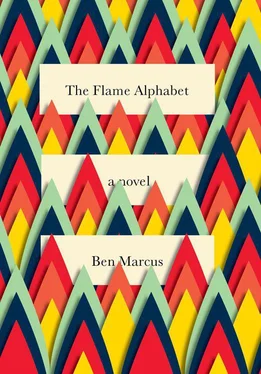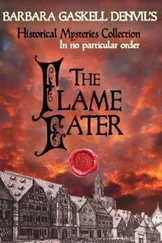Jim Adelle’s News Hour . A Special Report with Jim Adelle.
I wonder how many more days he had to live.
The feature continued. I settled in to listen as LeBov’s colleagues detailed his work, decried his methods, his results, his person.
“Claire!” I called again. She couldn’t still be asleep. I knew she’d be interested in this.
LeBov’s theory of allergy did not assist his career. One of the desert universities finally offered him a silo, but they kept him away from students. Later he distanced himself from the theory, then finally renounced the idea as dangerous.
Not really a rebuttal, I noted, to call your own idea dangerous. More of a sensationalizing gesture to increase attention.
This would turn out to be a signature method throughout LeBov’s career. He advanced an idea, often a problematic one, beat its drum until everyone was revolted, then turned on himself, often through pseudonym, and attacked his own work. He staged battles in the academic journals between two different versions of himself, argument and refutation coming from the same man.
At conferences LeBov sent imposters to the podium in his place. No one knew what he looked like, apparently. Then he sat hectoring his stand-in from the audience, protesting every idea, sometimes storming out in disgust. He accused himself of fraudulence, plagiarism. In at least some cases it would seem that he was correct.
LeBov’s signature work, in the end, addressed the trouble with language, the word trouble being, in his view, an understatement. He argued for most of his professional life that language should be best understood, aside from its marginal utility as a communication technology— can we honestly say it works? —as an impurity.
Language happens to be a toxin we are very good at producing, but not so good at absorbing, LeBov said. We could, per LeBov, in our lifetimes, not expect to process very much of it.
In answer to his detractors, LeBov asked what it was that ever suggested speech would not be toxic.
“Let us reverse the terms and assume that language, like nearly everything else, is poisonous when consumed to excess. Why not assault the folly that led to such widespread use of something so intense, so strong, as language, in the first place?”
Where was the regulatory body? LeBov wanted to know. Where was the marshaling instinct for speech, for language itself?
It causes the most unbearable strain on our systems, LeBov would say. It is not very different from a long, slow venom.
This idea was never granted legitimacy, evidenced by the battalion of naysayers. He simply had no proof. Witness after witness remarked on LeBov’s lack of evidence, and the word evidence came to indicate something significant that LeBov was missing, like an eye, a limb.
They had some audio for this, a response of sorts. More than anyone else in the world, I wish that I was wrong , answered LeBov, in a voice I felt I had heard before. What a relief that would be, to me, and also to my family .
“Claire,” I called out again, softer. I listened into the house to hear some sign of her. “Come sit with me.”
LeBov had written something, a screed, on the Tower of Babel, apparently, but retracted it before it could go to press. The other version of the story is that LeBov wrote in and protested to his own publisher, demanded they pulp the book. The book was a dangerous speculation, an assault on reality.
“Claire, Honey?” I called.
The Babel document came up a few times in the news interviews, though no one, it seemed, had read it. LeBov had an obsession with this myth. More than that, a bone to pick. He felt that it was a misleading, dangerous myth. It had, he supposedly argued, been copied out incorrectly, transmitted from generation to generation with a serious degree of error. Now the myth as we knew it presented a terrible impediment. I saw where Murphy had gotten the idea.
Claire appeared in the doorway, fully dressed, brushing the last of her hair.
“Why do you keep yelling my name?” she asked.
“I wanted you to see something,” I said. “This show I’m watching. On this guy who died.”
“Well, you could have said that. I wish you wouldn’t yell my name. I really can’t stand it.”
I apologized to her.
“It’s fine,” she said, leaving the room. “But I can’t stand it. Please don’t do that anymore.”
“I’m sorry,” I said again, feeling less sorry.
“And I said it’s fine ,” she yelled from another room. “Stop apologizing.”
Sorry, I said to myself, wondering how many times in my marriage I’d said that, how many times I’d meant it, how many times Claire had actually believed it, and, most important, how many times the utterance had any impact whatsoever on our dispute. What a lovely chart one could draw of this word Sorry .
A linguist from Banff scorned LeBov’s idea of a toxic language.
“This idea implies a physical component to language. Some material antigen,” she said. “What exactly is the substance, in chemical terms, that is causing this allergy he speaks of?” asked the linguist. “Language is the scapegoat here. If there is a problem—and I highly doubt there is, I cannot imagine such a thing—it is one for the immunologists.”
Was the Banff linguist, I wondered, simply part of LeBov’s long plan, designed to control the flow of the argument?
The linguist held forth, smugly dismissing an idea that had recently come into its own. It interested me that the linguist’s inability to imagine something constituted a sound rejection of its possibility.
I cannot imagine such a thing .
If only that kept it from coming true.
You had simply to look out the window to see the missing evidence she was calling for, watch the neighbors drive off and not return.
Actually you had only to look at Claire, if you could even bear to. I certainly tried to avoid sight of her, even dressed up, even with her hair, falling out as it was, brushed back over her small face. That sort of witness bearing did no one any favors.
LeBov was dead, so enemies could alert the world to how unimportant the old man really was, before irony would come along to smother them alive.
I thought of Murphy and wondered to what authority figure he would answer now. Was he trembling in his room at home now that his master had died?
The final segment of the news focused on LeBov’s Jewish problem. LeBov exhibited, admitted one commenter in rather shy tones, an unreasonable interest in the private activities of members of a certain religious faith .
LeBov often stoked, our expert remarked, the long-standing rumor of a segment of the Jewish population who worship privately, sharing wisdom through an underground signaling mechanism.
Of course we have found no basis for these rumors, the expert assured us.
Of course , I thought.
These rumors show a profound disrespect for people of diverse faiths.
Yes, yes. A profound disrespect .
When a scientist, particularly a scientist, the expert warned, buys into superstition, into lore, and uses them as paradigms of insight , our entire method of knowing is threatened. LeBov shows no respect by fanning the flames of a dangerous rumor, a rumor that only seeks to further isolate those among us who do practice authentic religious observance. To people of genuine faith, LeBov’s antics are a disgrace.
LeBov had apparently called for the forest Jews to come forward, to quit hoarding their fucking treasure.
From what I could tell, LeBov knew little of our practice. He bathed in the standard misinformation, took wild swings, threw out a stinking bait that, I was sure, none of us would take.
Читать дальше











